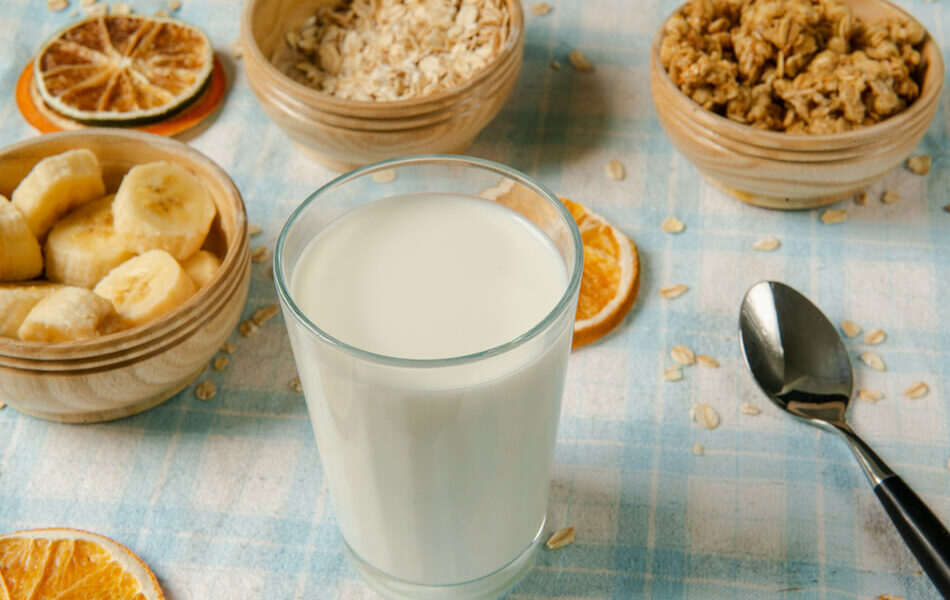Best Milk for Weight Loss: Choosing the Healthiest
Milk is a staple diet for most people. You can find different kinds of milk at the grocery stores: from regular to cashew, rice, macadamia, or almond milk. This can be confusing. Which of them is best for weight loss and your health?

Milk is one of the more nutritious foods we have, and its popularity is reflected in how commonly it’s consumed worldwide.
If you go to the stores searching for milk, there are dozens of options available for consumers. From cow’s, coconut milk, soy milk, goat, skim, cashew, almond, macadamia, organic, and rice milk. All these can confuse you, particularly if you’re watching your fat intake.
If you’re trying to slim down, it’s important to choose the right type of milk, so you don’t undo your calorie deficit by consuming too many empty calories. But the big question is, which is the best milk for weight loss? Is drinking milk good if you’re trying to lose weight?
Worry not. We have all the information you need to get the best milk to drink if you want to lose weight or slim down your waistline.
What Is the Healthiest Milk?
The healthiest milk should be rich in high-quality protein, a nutrient required for muscle growth and muscle building. It should also contain a fair amount of nutrients like zinc, calcium, magnesium, vitamin D, and vitamin B12. These nutrients are essential in strengthening your bones, boosting immunity, and increasing metabolism.
Until recently, skim milk was thought of as the healthiest milk for weight loss based on the belief that fat-free equaled weight loss, but this has changed drastically with the growing plant-based milk industry.
If you’re trying to lose weight and still want to enjoy your cup of coffee or your favorite breakfast cereal, the healthiest milk should be lower in calories and fat and have no added sugars or sweeteners.
We compare the nutritional content of 7 popular kinds of milk so you can pick the one that best meets your needs.
7 Best Milk Options for Weight Loss
Milk contains a lot of calories, but it can also be a great source of protein, calcium, and vitamins. If you’re trying to lose weight, you may want to consider cutting back on dairy products. The good news is that there are plenty of ways to enjoy milk without all the extra calories.
The following are some of the best milk options you can use as alternatives to regular milk:
#1 Coconut milk
Coconut milk is a milky white liquid obtained from mature coconut flesh. It has a slight sweetness and nuttiness, and it can be a great substitute for people who don’t prefer dairy or those who develop allergies to dairy products.
Coconut milk contains saturated fats called medium-chain triglycerides (MCTs). MCTs stimulate energy through heat production or a process known as thermogenesis.
Research suggests that MCTs found in coconut milk might help reduce body weight and the accumulation of fat, increase the feeling of fullness and decrease hunger, and increase insulin sensitivity, which may help slim down your waistline and enhance weight loss.
MCTs can also be used as a fuel source for your muscles during exercise, boosting your endurance. Research also shows that they may help reduce appetite and calorie consumption more than other fats.
Here’s the nutritional information of unsweetened coconut milk per 240ml (1 cup) serving as provided by the USDA.
- Calories: 45
- Fat: 4g
- Carbs: 1g
- Protein: 0g
It’s important to note that many aspects can contribute to your weight, including your exercise routine and food. Besides, coconut milk can be rich in fat and carbohydrates, so drinking too much can cause weight gain.
#2 Soy milk
Drinking soy milk provides your body with balanced nutrients without extra saturated fats and cholesterol.
Soy milk is lactose-free milk that contains less sugar than regular milk and has fewer calories. It has only 80 calories per cup, making it a great substitute for other forms of milk, especially if you want to shed a few pounds of your weight.
Studies have shown that incorporating soy milk in your diet might benefit your waist circumference and cardiovascular risk factors for overweight people.
Soy milk is also an excellent source of low-fat plant-based protein and contains essential fatty acids and various vitamins, minerals, and other beneficial micronutrients.
Soy milk can help suppress your appetite, promote more efficient metabolism, and prevent high blood pressure, high cholesterol, or other heart diseases.
Here’s the nutritional value of organic unsweetened soy milk per 240ml (1 cup) serving.
- Calories: 80
- Fat: 4g
- Carbs: 3g
- Protein: 6g
- Calcium: 20% of the RDA (recommended daily allowance)
- Phosphorus: 6% of the RDA
- Riboflavin: 30% of the RDA
- Vitamin D: 15% of the RDA
- Vitamin B12: 120% of the RDA
#3 Oat milk
Oat milk is not as nutritious as whole-grain oats, but it’s rich in vitamins and minerals and perfect for you if you’re lactose intolerant, allergic to nuts, or choose to go light on dairy.
Oat milk contains a soluble fiber known as beta-glucan, which absorbs water and forms a delectable cream that helps slow digestion.
This promotes satiety, meaning you will fill up faster and keep full longer. This can help control your appetite and promote weight loss.
The beta-glucan also helps maintain healthy cholesterol levels. It has cholesterol-lowering properties found when oats are converted into oat milk or other oat beverages.
Oat milk is also packed with nutrients such as calcium, potassium, magnesium, vitamin B12, and vitamin D, which can benefit your bones.
Calcium and vitamin B12 are essential for strong and healthy bones, while vitamin D helps keep the digestive system efficient and healthy, preventing weight gain.
While nutritional values vary from brand to brand and depending on whether or how the milk is fortified, a 100ml of unsweetened oat milk contains:
- Calories: 120
- Fat: 2.5g
- Fiber: 2g
- Carbs: 16g
- Protein: 3g
- Calcium: 25% of the RDA
- Phosphorus: 20% of the RDA
- Riboflavin: 45% of the RDA
- Vitamin D: 18% of the RDA
- Vitamin B12: 50% of the RDA
- Vitamin A: 20% of the RDA
#4 Almond milk
This is a popular alternative milk to regular cow’s milk. It’s low in calories and high in nutrients, which makes it a smart choice for weight watchers.
Almond milk is lower in calories than cow’s milk. A cup of unsweetened almond milk has 30–50 calories, compared with the same amount of whole cow’s milk of 146 calories.
If you drink 3 cups of regular cow’s milk a day and swap it with almond milk, you reduce 300 calories or more from your diet.
Almond milk contains only 1–2g of carbohydrates compared to 13g in regular milk. This makes it an excellent option for hydration.
It also contains less protein than cow’s milk and other dairy alternatives, such as soy or coconut. However, almond milk contains vitamin D and calcium, which are nutrients that some people may not get enough of in their diets.
If you’re looking for a protein boost, look for it elsewhere in your diet. A 240ml (1 cup) serving of unsweetened almond milk contains:
- Calories: 40.8
- Fat: 2g
- Carbs: 2g
- Protein: 1g
- Calcium: 10% of the RDA
It’s important to note that many brands have unhealthy added sugars. Always check the ingredients for unsweetened almond milk to enjoy its health benefits without consuming too much sugar and calories.
#5 Hemp milk
The hemp milk benefits for weight loss include the high protein content and the low-calorie count. It’s also a good source of omega-3 fatty acids, which help keep your heart healthy and reduce inflammation in your body, promoting weight loss.
The high protein content of hemp milk helps you feel full longer and prevents cravings for unhealthy foods high in calories. The low-calorie count means consuming more servings per day without increasing your daily caloric intake.
Unlike the other non-dairy milk choices, hemp milk contains all 9 essential amino acids needed by your body to build proteins for growth and repair tissue damage caused by free radicals from stressors like exercise.
A 240ml (1 cup) of hemp milk contains:
- Calories: 60
- Fat: 4g
- Fiber: 0g
- Carbs: 0g
- Protein: 3g
- Calcium: 20% of the RDA
- Phosphorus: 25% of the RDA
- Magnesium: 15% of the RDA
- Iron: 10% of the RDA
Some hemp milk manufacturers add healthy nutrients, while others may add sugars and thickeners. Ensure to read nutrition labels carefully.
#6 Skim milk
Skim milk is a low-fat milk product that has been processed to remove the cream. It contains fewer calories, fat, and cholesterol than regular whole milk, making it a popular choice for people trying to lose weight.
One glass of full cream milk contains around 10 grams of fat, while one glass of skim milk contains no fat or only 2 grams.
Also, skimmed milk contains more calcium, protein, phosphorus, vitamin D, and vitamin A and has no added sugar, making it a healthy option for a weight loss journey.
A 240ml (1 cup) skim milk has:
- Calories: 83.3
- Fat: 0.3g
- Carbs: 12g
- Protein: 8.2g
- Calcium: 25% of the RDA
- Phosphorus: 21% of the RDA
- Vitamin D: 14% of the RDA
#7 Cashew milk
Cashew milk contains fewer calories than other nut kinds of milk like almond or even cow milk, making it a good milk alternative for people trying to lose weight or those with diabetes or blood sugar issues.
This appears to be a calorie-saving food choice, with only 24 calories per cup.
Cashew milk also contains anacardic acid, a bioactive compound that inhibits fat accumulation during fat cell formation, limiting weight gain.
Here’s the nutritional value of a 240ml (1 cup) of unsweetened commercial cashew milk:
- Calories: 24
- Fat: 0g
- Carbs: 1g
- Protein: 1g
- Calcium: 45% of the RDA
- Vitamin D: 25% of the RDA
What Is the Best Milk Alternative for Weight Loss?
The best milk alternatives for weight loss are plant-based options such as rice milk, almond, soy, coconut, cashew, hemp, and macadamia milk. For weight loss, you want to go with the one that is lowest in calories and has the least amount of sugar or sweetener added.
Dairy milk is high in protein and carbohydrates, fats, and calories. Therefore, if you’re watching your weight, drinking a few glasses of regular milk per day is likely not the best idea.
Instead, try some milk alternatives such as cashew milk or almond milk. They contain nutrients, healthy fats, and high-quality carbs and can reduce your appetite, so you’ll reach your weight loss goals quickly.
Should You Choose Low-Fat Milk?
If plant-based alternatives aren’t an option for you (based on your taste preference), low-fat milk can be an excellent option for you. Compared to whole milk, low-fat milk has fewer calories and more vitamins. It also has more protein than whole or skimmed milk, filling you up faster and eating less food.
Low-fat milk also has less saturated fat than whole milk, which raises your bad cholesterol (LDL) and increases your risk for heart disease.
It’s also essential to know that low-fat milk tends to contain added sugar or artificial sweeteners such as sucralose, ingredients often used to make up for lost flavor when fat is removed from milk. This can cause a gain in weight instead of loss.
FAQs
Oat milk has more calories, carbs, and fiber than cow’s milk and other milk alternatives. It provides less protein than regular milk.
The best milk for protein shakes is low-fat, low-sugar, and low-calorie. Skim milk is recommended for protein shakes. It has a good mix of nutrients and is low in fat and calories. If lactose intolerant, you can use pea milk or soy milk with high protein content.
Cow’s milk is a good source of high-quality protein, rich in calcium, minerals, and vitamins A, B, and D, making it healthy for children and adults. But it also has lactose, so if you’re sensitive to it, look for an alternative such as unsweetened almond milk, which is a great choice for those following a keto diet.
Milk is considered a protein. It has all 9 essential amino acids required for your body to function optimally. Milk contains two types of protein – casein and whey protein.
Several plant-based kinds of milk, such as almond, hemp, soy, oat, coconut, macadamia, and cashew, are considered healthy. Cow’s milk is also considered healthy, but you should take it in moderation, alternating with plant-based or low-fat options.
A Word From Our Nutritionist
Cow’s milk is rich in protein, calcium, and B vitamins. Still, you might choose a milk alternative if you’re allergic to milk, lactose intolerant, following a vegan or vegetarian diet, or you’re concerned about milk’s added antibiotics and hormones.
When looking for the best milk alternative, you plan to consume frequently, go for the one that tastes the best. Try different brands, types, and flavors. Choose the one you like and stick to it, so you’re more likely to consume it.
Read the nutrition label carefully. All plant-based kinds of milk are not manufactured the same. Ensure the one you consume provides the nutrients important to you, such as calcium or vitamin D, no added sugars, and fewer calories and fats. Strive not to get your nutrients from supplements but from food.
If you’re vegan, consider getting a higher protein option. Many milk alternatives don’t offer much protein. Choose plant-based milk that supplies it. The best milk alternatives are pea, soy, and flaxseed kinds of milk.
It’s also important to choose the purest option available with the best value. Some brands can cost twice as much as dairy milk. Choose an unsweetened product that contains nutrients important to you and doesn’t contain many thickeners.
Conclusion
Nothing stops you from switching from cow’s milk to plant-based milk or just including one or two to add variety to your diet.
When it comes to determining which milk is best for weight loss, there is no one-size-fits-all solution. While low-fat dairy contains more proteins, plant-based alternatives contain fewer calories.
As a result, any options may be suitable for your diet. It’s a good idea to switch between different types of milk. When it comes to plant-based milk, go for those with no artificial additives or sweeteners for maximum health benefits.
Leave a comment

















































 Select your language:
Select your language: 









Thank You For This Amazing content.